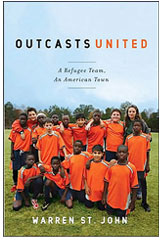Books |
Outcasts United: A Refugee Team, an American Town
Warren St. John
By
Published: Apr 27, 2009
Category:
Non Fiction
How does a soccer coach find a practice field for her team? Google Earth.
But why, in a town that’s not short of parks, is she looking for a field on Google Earth?
Because the mayor keeps issuing what seem like illegal orders to deny her team access to any of the lush local fields.
And why would he do that?
Because this is Clarkston, Georgia, a town of 7,200 a dozen miles from Atlanta. And the members of the soccer team are not only boys of color, they are foreigners — Africans, mostly — who have come to Clarkston as part of a wave of immigrants.
Outcasts United: A Refugee Team, an American Town is set in the feel-bad reality of a small town that never wanted to be the dumping ground for people fleeing conflict zones. It’s a story of bumbling villains — the mayor is a decent soul who’s way over his head; the bad cop is the sort of jerk you can find anywhere — and unlikely heroes. The first heroes are, of course, the Fugees, who overcome terrible memories, language barriers and unthinking prejudice to become — against great odds — a team. But at the top of the list is the team’s coach: Luma Mufleh, who is, in her own way, also a refugee.
The boys are really the lesser story, because without the commitment and self-sacrifice of this exceptional coach, their team would never have lasted a year. So weep for their pasts. Cheer for their success. Worry about their futures. But reserve the standing ovation for Luma Mufleh. Born into privilege in Jordan, she graduated from Smith College and decided to stay in the United States. Her father’s response was to cut her off. “No more money, no more phone calls. He was finished with his daughter.”
So the Smith graduate got work cleaning toilets and washing dishes. She moved to Georgia for the weather. One day she drove to Clarkston and saw refugee kids playing a style of soccer she knew and liked. She went to the YMCA, discovered a coaching job was available, and was hired to run a girls’ team. Just one accident after another…..
Mufleh did not coddle her players. She expected discipline and compliance, and when she didn’t get it, the kids paid they price. Her girls ran a lot — but if they were late, they ran extra laps. And woe be to the player who complained to her parents.
The boys were even more challenging, if only because they represented more of a threat to the town. They weren’t. They were just poor, often hungry, not really ready to assimilate. Mufleh worked 60 hours a week coaching them, helping their families, making sure they got their school work done. Exhausting? “You start off on your own," she says, "and you suddenly have a family of a hundred and twenty.”
St. John draws the boys as well as he can, but their stories do merge. You think nothing that happens to them in Clarkston can be half as dramatic as the events that brought them to America — imagine being a kid in Liberia and running out of your house as your father is being killed inside. Well, imagine, in America, seeing your coach arrested, handcuffed, and carted off to jail — as you’re going to a game! [Mufleh’s crime? A burned-out tail light.]
The soccer style of the Fugees is exciting, and St. John’s descriptions of their games are crisp and tense. But their victories on the field are small compared to what their coach accomplished in practice and in her pre-game talks. Luma Mufleh deserved the front page Times story. She earned — many times over — the money that flows to the team from the sale of the film rights. And she’s more than worthy of this 300-page Valentine.
To buy “Outcasts United” from Amazon.com, click here.
To buy the Kindle edition of “Outcasts United” from Amazon.com, click here.
To buy the Audio CD of “Outcasts United” from Amazon.com, click here.
To visit the web site for the Fugees, click here.


